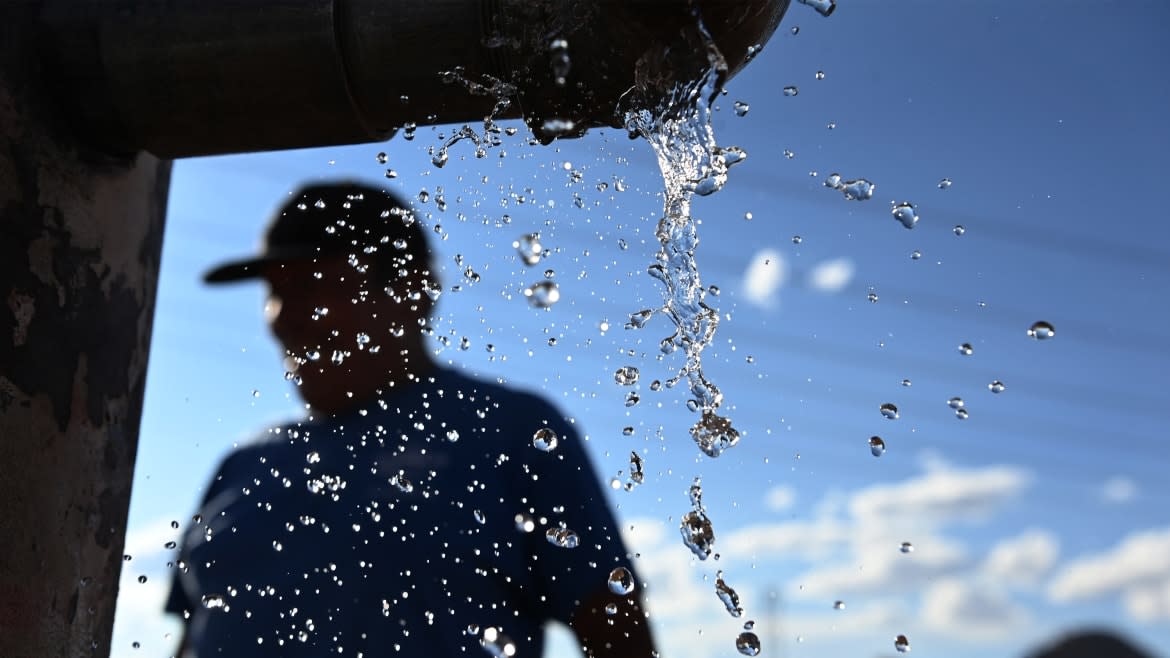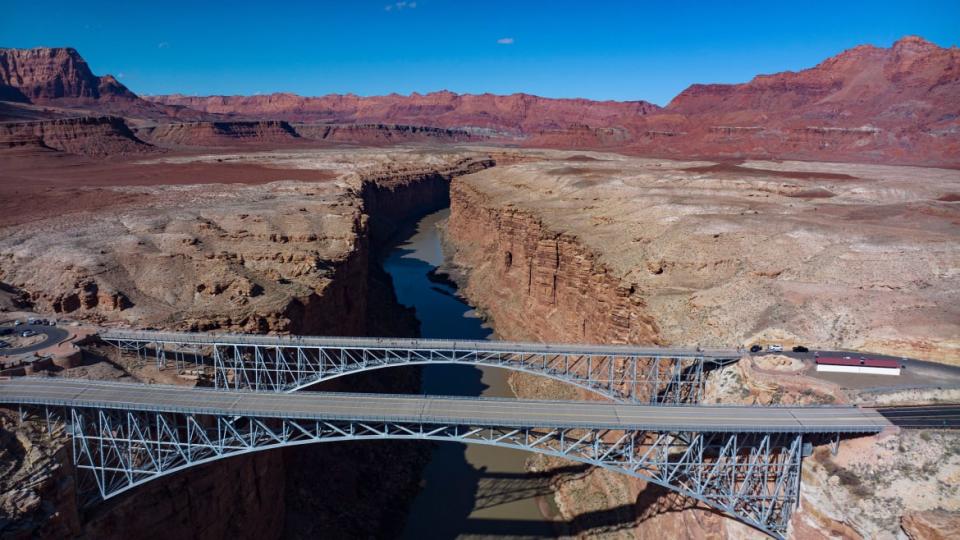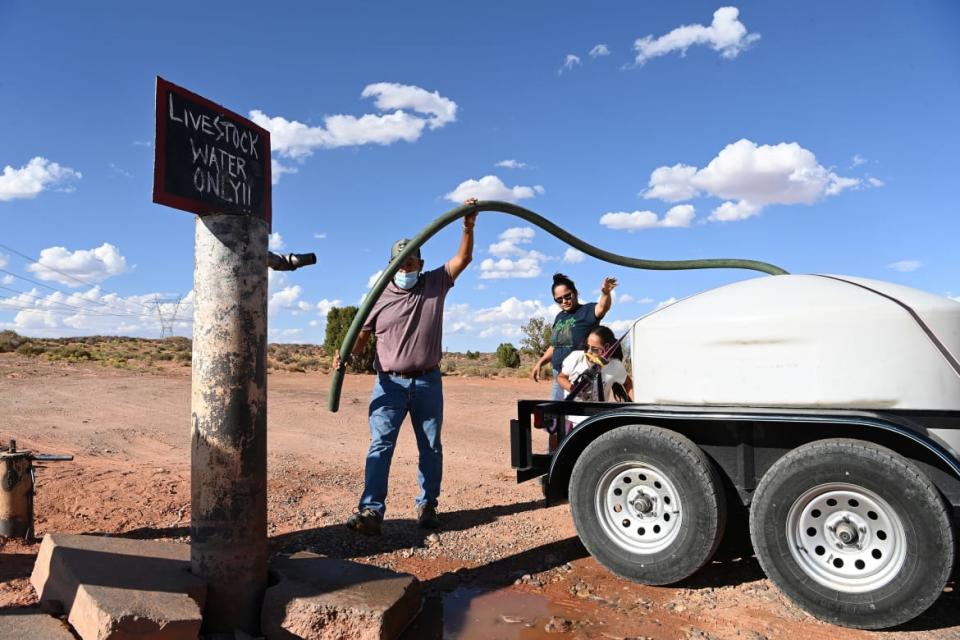Navajo Nation Just Got Hosed by the Supreme Court—Again

When I first learned about the Trail of Tears in junior high school, after getting over my outrage and disgust, my first thought was, “Thank God we don’t do that anymore.”
I was wrong. Just today, the U.S. Supreme Court proved that we are still doing it.
Navajo Nation v. Arizona is this term’s most important Supreme Court ruling that you haven’t heard of. But the Navajo have. And they know that the high court has just stripped them of rights that they thought that they have had for more than a century.
Supreme Court Might Allow Vendors to Discriminate Against Customers
The Navajo (who refer to themselves as the Diné) have lived in the Colorado River Basin—in what is now Arizona, New Mexico, and Colorado—for hundreds of years.
Even though the United States and the Navajo signed a treaty in 1849, 14 years later federal troops drove the Navajos from their ancestral homeland and marched them “some 300 miles” to live captive at Bosque Redondo, “a small piece of land on the Pecos River in eastern New Mexico.” This became known as the Long Walk, and it was a disaster: Bosque Redondo lacked sufficient water or arable land and was unsuitable for livestock. Many Navajo died.
Finally, in 1868, U.S. Army Commander William Tecumseh Sherman agreed to take them back to a small portion of their original homeland—an area later made even smaller in the new 1868 treaty. “No worries,” promised the white man: the federal government guaranteed that the Navajo would have access to resources that they would need to maintain an agricultural way of life.
The federal government made more promises. In 1908, the Supreme Court, in Winters v. United States, held that rights to land necessarily included water rights connected to that land. That means that the Navajo should also have had the necessary water rights to make life on that reservation barely manageable.

Navajo Bridge over Colorado River at Lees Landing in Vermillion National Monument, Page, Arizona.
As with most promises the white man made to the Indians, it was broken. Half a century after Winters—whose rights are supposed to be senior to all other rights claimed—the Supreme Court adjudicated most of the Colorado River, and split it between seven states along the river and five Indian tribes. But the decree did not include the Navajo. The tribe attempted to intervene in the litigation and was blocked by the federal government, which claimed that it would see to it that their rights were taken care of. Yet Washington broke its promise, and to this day, the Navajo have no adjudicated rights on the Colorado River, which runs next to their land.
In Navajo Country now, it is easy to see the result.
While the average American uses 80-100 gallons of water per day for household needs, Navajo Nation members use about seven. The resulting difficulty in maintaining hand hygiene contributed to a COVID-19 death rate higher in the Nation than in many other parts of the United States.
More than 30 percent of those on the reservation lack running water altogether. As ProPublica reported just two weeks ago, Arizona goes to great lengths to block the Navajo’s access to water, undermining their economic development: even a newly-constructed hospital on the reservation stands empty because of state officials’ refusal to negotiate in good faith over the tribe’s water rights.
The Navajo have waited literally for decades for the federal government to fulfill its promises, and the answer from Washington has been a stone wall.
So in 2014, they sued the federal government to finally fulfill its promises. Notably, the tribe did not demand an adjudication of its right in the Colorado. It merely asked that the federal government assess tribal water needs and come up with a plan to meet them.
Why Economic Justice for Indigenous Groups Is Vital to Saving Endangered Species
The Supreme Court has long held that the federal government has a “trust obligation” to tribes. The Navajo Nation claims that the federal government has the trust obligation to give it access to adequate water. Washington breached its trust obligations and needed after decades to make the tribe whole. The Ninth Circuit agreed.
But states like Arizona and Colorado, which do not want the Navajo intruding on their rights on the river, petitioned the Supreme Court for relief. They claim that when the Supreme Court adjudicated the Colorado River back in 1963, it reserved for itself the right to divide the river. The tribes couldn’t sue the federal government, because then the federal government might decide that the river needed to be changed.
If this seems strange to you, it should.

Members of the Navajo Nation fill up a water tank at a watering station that is meant to provide water for livestock in Gap, AZ. Many people that live on Navajo Nation have water access issues despite their close proximity to the Colorado River.
The tribe cannot try to get the Colorado River redivided: the federal government has prevented it from doing so.
Fine, say the Navajo in this litigation. If you won’t allow us to get our specific water rights from the Colorado, then you make sure that we have the water we were promised: assess our needs and come up with a plan to meet them.
But Washington rejected that one, as well.
Amazingly, the Interior Department (currently headed by Deb Haaland, the first Native American Cabinet Secretary) contends that it has essentially no legally binding obligations to the Navajo at all. Unless the treaty specifically made particular assurances that could clairvoyantly predict water needs 150 years in the future, it claims, the government has no obligation at all.
And the Supreme Court agreed.
Essentially, its argument is: even though the treaty guarantees you the right to farm your land, and the federal government is your trustee, you can’t force the federal government to actually act on its obligations, and you can’t sue on your own to get water that runs across your land. To this, the Court lamely says that “Congress and the President may update the law to meet modern policy priorities and needs.”
For the Navajo, such an argument adds insult to injury.
Putin-Like Dictators Have Long Felt the Love From the U.S. Right
As Justice Neil Gorsuch noted in his dissent: “The Navajo have tried it all. They have written federal officials. They have moved this Court to clarify the United States’ responsibilities when representing them. They have sought to intervene directly in water-related litigation. And when all of those efforts were rebuffed, they brought a claim seeking to compel the United States to make good on its treaty obligations by providing an accounting of what water rights it holds on their behalf. At each turn, they have received the same answer: ‘Try again.’ When this routine first began in earnest, Elvis was still making his rounds on The Ed Sullivan Show.”
The Colorado River is complex. The entire West is buckling under climate change, and the original division of the river assumed water resources that don’t exist. States rightly are worried about what will happen with new claimants.
But that is no reason to say that the poorest, most disadvantaged party, with by far the oldest claim on the river, and suffering the greatest historical injustice, should be the odd one out.
As William Faulkner explained, “The past is never dead. It isn’t even past.” The Navajo know.
Get the Daily Beast's biggest scoops and scandals delivered right to your inbox. Sign up now.
Stay informed and gain unlimited access to the Daily Beast's unmatched reporting. Subscribe now.

